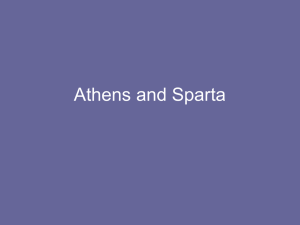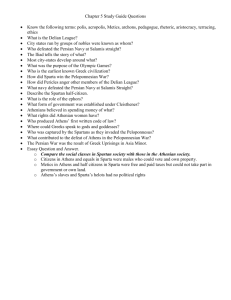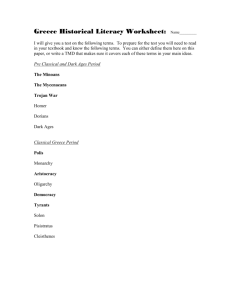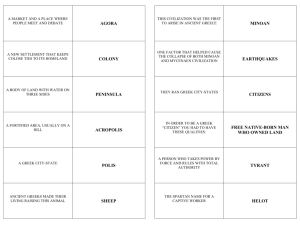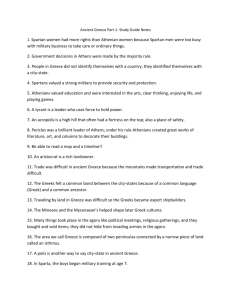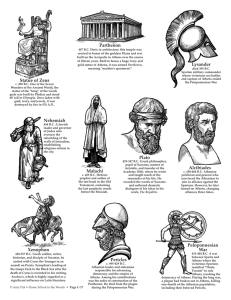A TALE OF TWO CITIES: ATHENS AND SPARTA. Life was very
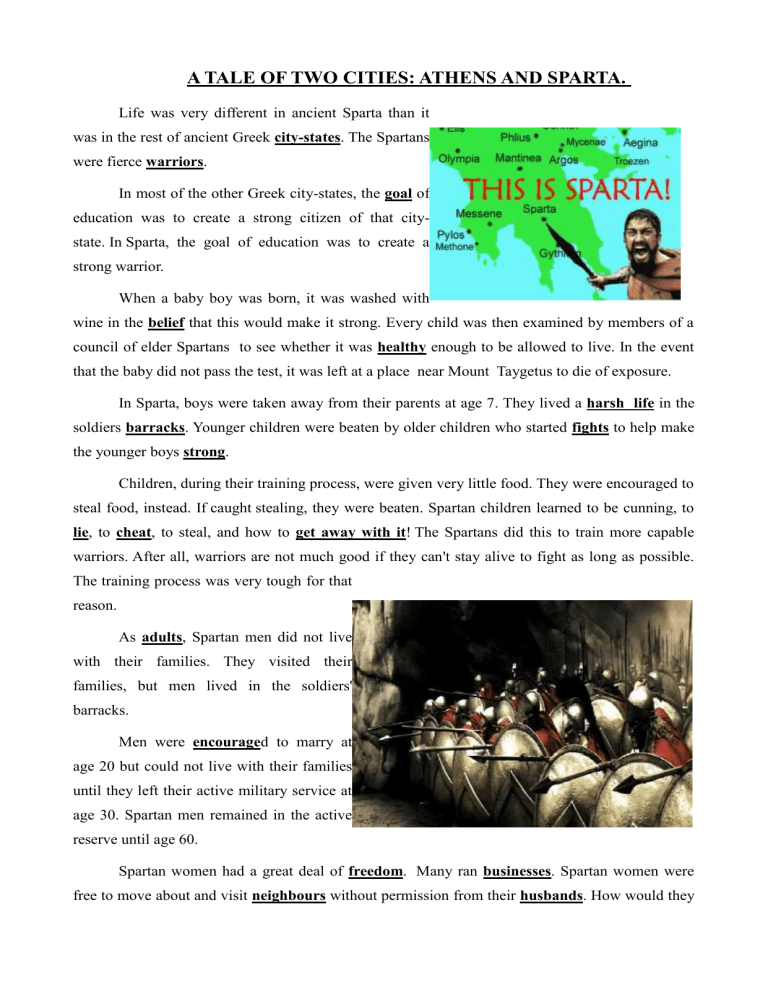
A TALE OF TWO CITIES: ATHENS AND SPARTA.
Life was very different in ancient Sparta than it was in the rest of ancient Greek city-states . The Spartans were fierce warriors .
In most of the other Greek city-states, the goal of education was to create a strong citizen of that citystate. In Sparta, the goal of education was to create a strong warrior.
When a baby boy was born, it was washed with wine in the belief that this would make it strong. Every child was then examined by members of a council of elder Spartans to see whether it was healthy enough to be allowed to live. In the event that the baby did not pass the test, it was left at a place near Mount Taygetus to die of exposure.
In Sparta, boys were taken away from their parents at age 7. They lived a harsh life in the soldiers barracks . Younger children were beaten by older children who started fights to help make the younger boys strong .
Children, during their training process, were given very little food. They were encouraged to steal food, instead. If caught stealing, they were beaten. Spartan children learned to be cunning, to lie , to cheat , to steal, and how to get away with it ! The Spartans did this to train more capable warriors. After all, warriors are not much good if they can't stay alive to fight as long as possible.
The training process was very tough for that reason.
As adults , Spartan men did not live with their families. They visited their families, but men lived in the soldiers' barracks.
Men were encourage d to marry at age 20 but could not live with their families until they left their active military service at age 30. Spartan men remained in the active reserve until age 60.
Spartan women had a great deal of freedom . Many ran businesses . Spartan women were free to move about and visit neighbours without permission from their husbands . How would they
get permission? The men were often off fighting.
1.
Write down the verbs of paragraphs number 3 and 5 in past, infinite and the meaning in spanish.
Verb Past Time Infinitive Meaning.
2.
Write down the meaning of the underlined words in your worksheet.
3.
Answer the questions:
1.
Do you think the city-state of Sparta was surrounded by walls?.
2.
If Spartan men were warriors, do you think they had a lot of slaves?.
3.
Spartan women had more freedom than other city-states, why?.
4.
Between the age of 20 and 30 years old a Spartan must be ready for war all the time, where did they live?.
5.
When a Spartan was 30 years old he became part of the active military reserve, could they live at home with his wife and childrens then?.
6.
What happened when a non healthy child was born?
4.
Try to describe what the Spartans are doing in the second picture.
Athens was the largest city in Greece. Athens had fertile valleys and became rich for it's sources of silver , lead and marble Athens also had the largest navy in Greece. They were famed for their literature, poetry, drama, theatre, schools, buildings, and government.
The Greeks believed that each city-state in ancient Greece had a god or a goddess in charge of it, their special patron. For Athens, the patron was Athena, goddess of wisdom. Perhaps because
Athena was their patron (protector-goddess), Athenians put emphasis on education.
Boys were educated quite differently than in Sparta. Until age 6 or 7, boys were taught at home by their mothers. From 7-14, boys attended a day school outside the home. There, they memorized Homeric poetry and learnEd to play the lyre. They learned drama, public speaking, reading, writing, math, and perhaps even how to play the flute . After middle school, they went to a four year high school and learned more about math, science, and government. At 18, they attended two years of military school. Girls learned at home from their mothers. They learned how to run a home, and how to be good wives and mothers.
Each city-state chose its own form of government. For about 100 years, the government of
Athens was a democracy. In Athens, citizens (the men) met each week to discuss problems because only male citizens had the right to vote.
Women could not be citizens nor could slaves or foreigners.
The city's most famous building was the temple called the Parthenon. It was located on a hill called the Acropolis. Inside the
Parthenon there was a statue of the goddess
Athena, protector-goddess of the city. The statue of Athena was made of gold and ivory .
It was 12 meters high.
The most famous politician of Athens was Pericles (495-
429BC). He was general of Athens in the period between the end of the Greek-Persian Wars and the first years of the Peloponnesian Wars (a war between Athens and its allies against Sparta and its allies). He started the reconstruction of the Acropolis (destroyed by the Persian Invasion). The
Acropolis would show the beauty and might of the city of Athens to the rest of the Greek World. In the project of rebuilding the Acropolis were working thousands of people, which gave support to
Pericles between the common people.
1. Write down the verbs of paragraphs number 3 and 6 in past time, infinite and the meaning in spanish.
Verb Past Time Infinitive Meaning.
2. Write down the meaning of the underlined words in your worksheet.
3. How was the education of a boy in Athens?.
________________________________________________________________________________
________________________________________________________________________________
______________________________________________________________
4. How was the education of a girl in Athens?.
________________________________________________________________________________
____________________________________________________________________
5. Who was Pericles?.
________________________________________________________________________________
____________________________________________________________________
6. What was the Parthenon?.
________________________________________________________________________________
____________________________________________________________________
6. True or False:
1.
Athens had no economic resources.
2.
Pericles was famous for rebuilding the Acropolis.
3.
The girls attended poetry classes in Athens.
4.
The Statue of Athena was made of silver.
5.
Only male citizens had the right to vote in Athens.
6.
The Parthenon was located in the center of the city of Athens.
7.
Athenians must how to play flute.
8.
Athens had the largest navy in Greece.
9.
Athens and Sparta were allied during the Peloponnesian War.
10.
The Statue of Athena was 40 meters high.

